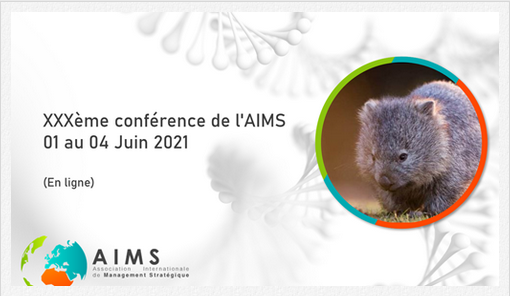Céline Bérard, Julie-Céline Grobon Bataille et Sabina Tartea ont participé à l’AIMS 2021
Trois communications ont été présentées à la conférence de l’AIMS 2021 (en ligne) :
- External information seeking as a driver of ambidexterity in SMEs: The moderating role of structural empowerment, par Céline Bérard & Martin Cloutier.
Résumé : Although previous studies have highlighted the importance of accessing external information to achieve ambidexterity, information seeking is known to be a costly activity with uncertain outcomes and that presents particular challenges for SMEs due to their limited resources. However, little is known about how SMEs can best benefit from their external information seeking activities for ambidexterity purposes, given specific organizational practices. We thus propose to examine the effects on ambidexterity of environmental scanning and external managerial networking, as means of accessing external information, by taking into account the moderating role of structural empowerment in SMEs. Using a survey administered to CEOs of 1,439 French manufacturing SMEs, our main results indicate that empowerment positively moderates the effect of scanning range on ambidexterity, but negatively moderates the effect of network intensity. This reveals the complexity of the relationships between external information seeking, structural empowerment and ambidexterity in SMEs.
- Les conditions organisationnelles du travail institutionnel : Étude du CJD, mouvement patronal militant qui cherche à promouvoir des pratiques innovantes, par Julie-Céline Grobon Bataille
Résumé : Dans cet article nous cherchons à analyser comment un mouvement patronal au fonctionnement adhocratique militant, ici le CJD (Centre des Jeunes Dirigeants), institutionnalise des pratiques expérimentées par ses adhérents. Dans le cadre d’une recherche-action nous étudions 7 tentatives du mouvement entre 2016 jusqu’en 2021. À travers la grille de lecture du travail de création institutionnelle, nous identifions les facteurs organisationnels qui interviennent dans le processus d’institutionnalisation des pratiques. Ce processus est en trois phases : identification des pratiques par la recommandation entre pairs, sélection et évaluation par des critères et diffusion au reste du réseau et aux parties prenantes. Nous constatons que la diffusion est perturbée par des facteurs organisationnels et qu’une tension entre en jeu entre la façon dont est structurée l’organisation et sa volonté de devenir un mouvement militant influent.
- The impact of exploration, exploitation and ambidexterity on systematic risk in public Euronext Growth SMEs, par Sabina Tartea.
Résumé : The main objective of this paper is to contribute to the literature on ambidexterity in SMEs by providing, more specifically, a look at the relationship between ambidexterity and risk in these companies. Our main theoretical objective is to identify the role played by ambidexterity as well as its components, exploration and exploitation, on the systematic risk of SMEs listed on the Euronext Growth stock market. Our interest therefore is to understand the role played by ambidexterity in risk management within SMEs, in view of increasing their chance of survival at this particular development stage. The results of our research show that, on a short-term systematic risk (one β to two years) of SMEs listed on Euronext Growth, exploration has an amplifying effect while exploitation has a reducing effect. Contrary to what was expected, ambidexterity also has an amplifying effect on systematic risk, which invites us to explore the explanatory elements of this result going against the widely accepted observation in the literature that ambidexterity plays a positive role in risk reduction.

